

Loi renseignement : une forte défiance des Français selon un sondage CSA / barreau de Paris. French-American Lawyer to Refer to French Surveillance Watchdog against International Surveillance. Paris, 16 September 2015 — After yesterday's announcement by the French government that the bill on International Surveillance will be discussed on a fast track procedure, the bill was adopted this morning at the Defence Committee by the French Lower Chamber in only twenty minutes and without almost any debate.
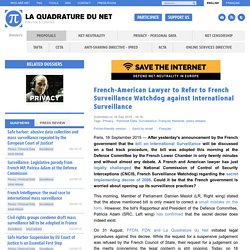
A French and American lawyer has just legally challenged the National Commission of Control of Security Interceptions (CNCIS, French Surveillance Watchdog) regarding the secret implementing decree of 2008. Could it be that the French government is worried about opening up its surveillance practices? This morning, Member of Parliament Damien Meslot (LR, Right wing) stated that the above mentioned bill is only meant to correct a small mistake on the form. However, the bill's Rapporteur and President of the Defence Committee, Patricia Adam (SRC, Left wing) has confirmed that the secret decree does indeed exist. Read Pierre Ciric's referral (fr) here. 1. French hacks go after new surveillance law … with the help of the ECHR.
A collection of French journos have teamed up to take a new surveillance law to the European Court of Human Rights (ECHR), claiming it infringes "the rights and freedoms of journalists".

France’s so-called Patriot Act came into force on Saturday, but the French legal press association, APJ, said it would attempt to have the law overturned. “This law infringes the rights and freedoms of journalists, and their sources," the said body. "Government surveillance, through wiretaps or mass data collection, will consequently affect the right to information of our democratic society. " "Journalists may be victims of these violations without even being informed since the monitoring and recordings are secret,” the APJ added. The Projet de Loi Relatif au Renseignement gives sweeping powers to intelligence agencies and was passed by both chambers of the French Parliament during the summer, before being given the green light by the national Constitutional Court.
Sponsored: Are DLP and DTP still an issue? France approves 'Big Brother' surveillance powers despite UN concern. France’s highest authority on constitutional matters has approved a controversial bill that gives the state sweeping new powers to spy on citizens.
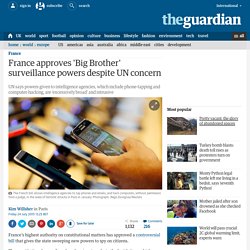
The constitutional council made only minor tweaks to the legislation, which human rights and privacy campaigners, as well as the United Nations, have described as paving the way for “very intrusive” surveillance and state-approved eavesdropping and computer-hacking. In a report published on Friday, the 18-strong United Nations committee for human rights warned that the surveillance powers granted to French intelligence agencies were “excessively broad”.
It said the the bill “grants overly broad powers for very intrusive surveillance on the basis of vast and badly defined objectives” and called on France to “guarantee that any interference in private life must conform to principles of legality, proportionality and necessity”. “From now on, France has a security framework against terrorism that respects liberties. France: New surveillance law a major blow to human rights. Extensive powers allowing French authorities to monitor people online and offline will come into force in a matter of days after the country’s highest constitutional authority endorsed all but three sections of a new surveillance law, Amnesty International said today.
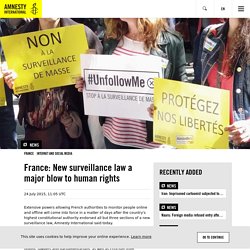
The French government rushed the Intelligence Bill through parliament in the wake of the Paris attacks earlier this year, turning a deaf ear to strong opposition from rights groups, judges, tech companies, trade unions, lawyers and parliamentarians, as well as criticism from international human rights bodies. The surveillance measures authorized by this law are wildly out of proportion. Large swathes of France’s population could soon find themselves under surveillance on obscure grounds and without prior judicial approval. “Last night’s decision clears the last hurdle for a law that will deal a major blow to human rights in France.
Les Français fortement opposés aux moyens de la loi Renseignement. Le Barreau des avocats de Paris, dont le bâtonnier Pierre-Olivier Sur avait dénoncé "un mensonge d'Etat" en parlant de la loi sur le renseignement, a fait réaliser un sondage complet par l'institut CSA (.pdf), pour jauger ce que les Français étaient prêts à accepter comme renoncements à leur vie privée.
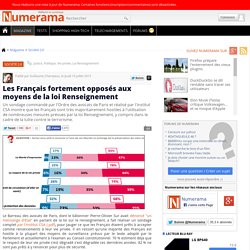
Il en ressort qu'une majorité des Français est hostile à la plupart des moyens de surveillance prévus par le texte adopté par le Parlement et actuellement à l'examen au Conseil constitutionnel. 70 % estiment déjà que le respect de leur vie privée s'est dégradé s'est dégradée ces dernières années. 82 % ne sont pas prêts à y renoncer pour plus de sécurité. Cette dernière mesure est la seule reconnue comme étant systématique par le gouvernement, et imposée comme telle par la loi. Loi renseignement : sondage exclusif Ordre des avocats de Paris / Institut CSA.
Les Français perçoivent une dégradation de la protection de leur vie privée.
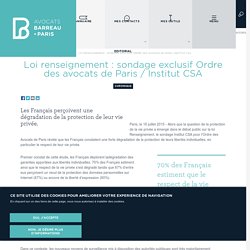
Loi renseignement : des avocats franco-américains dénoncent la PPL sur la surveillance internationale. Loi Renseignement : le mémoire d'un collectif d'avocats franco-américains. Nous diffusons ci-dessous le mémoire adressé au Conseil constitutionnel par la FABA, la French-American Bar Association.

Ce groupement d’avocats franco-américain montre de nouvelles zones troubles dans le projet de loi Renseignement. La décision du Conseil constitutionnel est attendue pour le 23 juillet prochain.